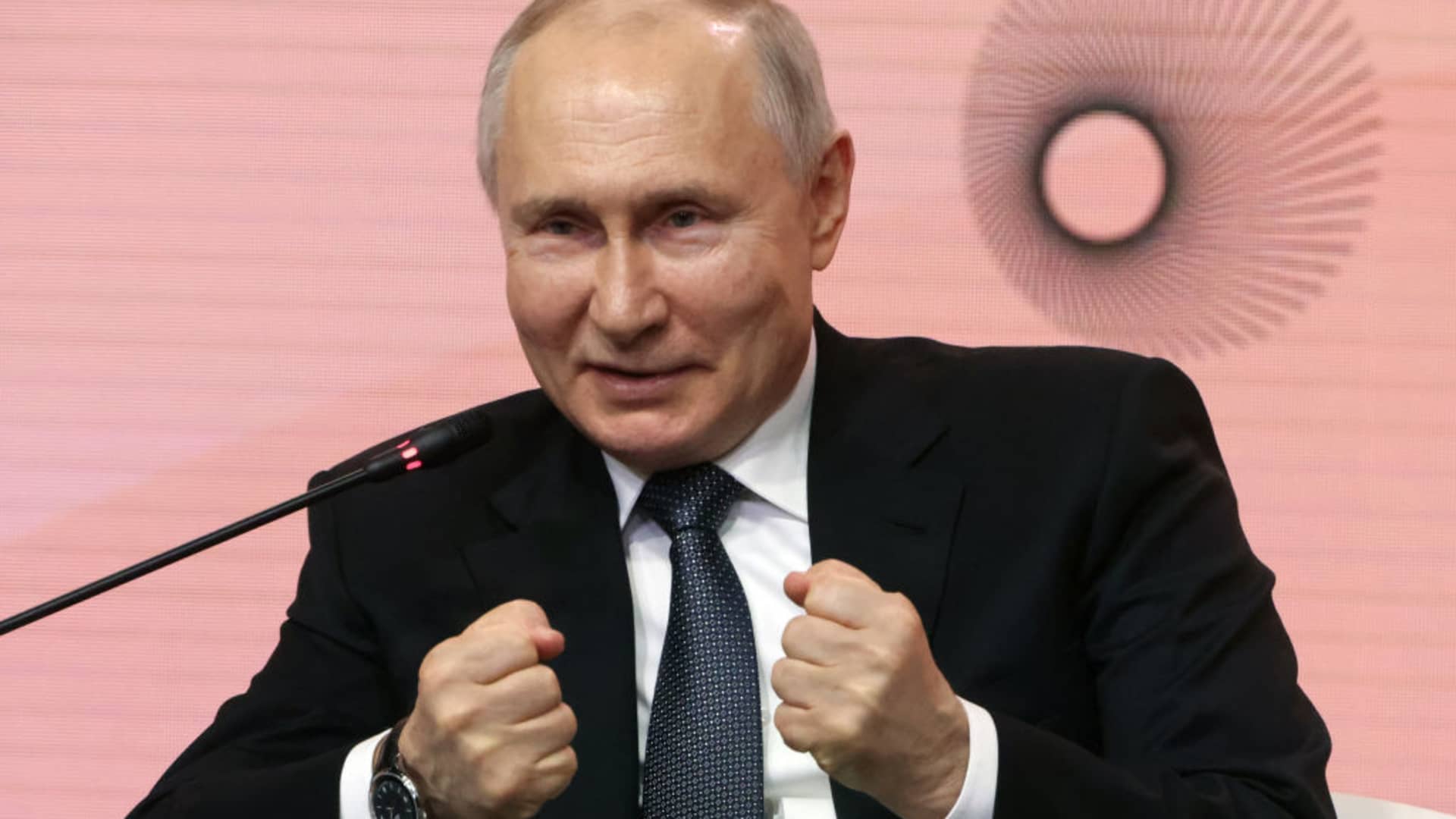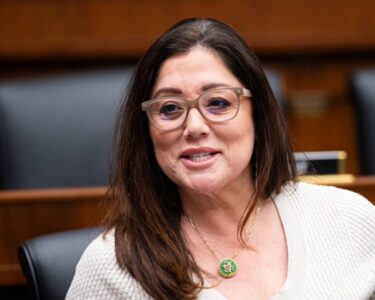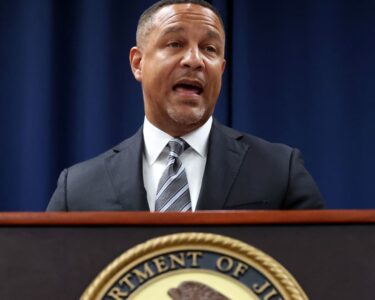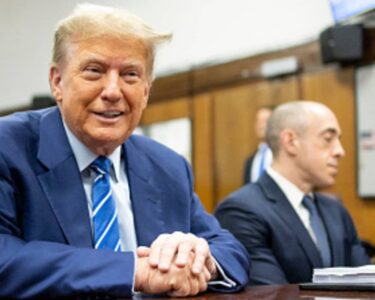This was CNBC’s live blog tracking developments on the war in Ukraine.
A Putin-sympathizing candidate for prime minister is neck and neck with his rival progressive party in Slovakia’s general election, which will take place on Saturday.
Slovakia has been a staunch supporter of Ukraine since Russia’s full-scale invasion began, and has sent it air defense systems and MiG jets.
Robert Fico — who served two prior periods as Slovakia’s prime minister, from 2006 to 2010 and 2012 to 2018 — is a fierce critic of Ukraine and the EU’s anti-Russian position on the war, and has vowed not to send arms to its eastern neighbor. A win for the populist leader could also fracture the EU’s efforts at a unified front against Russia.
Four occupied regions of Ukraine will be included for the first time in a fresh round of Russian military conscriptions, Russia’s Defense Ministry said in a statement Friday.
Russian authorities reported Ukrainian drone strikes on an electrical substation in the western region of Kursk, which they said knocked out five populated areas and a hospital. CNBC could not verify the details on the ground.
Meanwhile, a former Wagner Group commander has now moved into a post at the Russian defense ministry, Kremlin spokesman Dmitry Peskov told state media.
Four occupied regions of Ukraine will be included for the first time in a fresh round of Russian military conscriptions, Russia’s Defense Ministry said in a statement Friday, according to Reuters.
Men in Ukraine’s Luhansk, Donetsk, Kherson and Zaporizhzhia regions, which have been illegally annexed by Russia, will be among the 130,000 citizens called up for statutory military service from Oct. 1, after President Vladimir Putin signed a decree outlining Russia’s autumn conscription campaign.
The move comes as Russia’s armed forces press on with their “special military operation” in Ukraine which continues into its 20th month.
— Karen Gilchrist
Switzerland on Friday announced further sanctions on Iran in connection with its supply of drones to Russia, bringing it in line with the European Union.
“In view of Iran’s continued military support for Russia’s military aggression against Ukraine, which is contrary to international law, and the fact that Russia is using Iranian-made Unmanned Aerial Vehicles (UAVs) to support the military aggression, the Federal Council decided on 29 September to impose further sanctions on the Islamic Republic of Iran,” the Swiss government said in a statement.
“The Federal Council has adopted the sanctions imposed by the EU on 20 July as part of its new framework for restrictive measures. The sale, supply, export and transit of components used for the manufacture and production of Unmanned Aerial Vehicles (UAVs) is now prohibited,” it added.
— Karen Gilchrist
The U.K.’s government put asset freezes and travel bans on Russian officials in four of Ukraine’s regions — Zaporizhzhia, Donetsk, Kherson, and Crimea — that have been illegally annexed by Russia.
It also imposed sanctions on the Russian emergencies minister, Alexander Kurenkov, and the country’s central election commission secretary Natalya Alekseevna Budarina.
British Foreign Secretary James Cleverly asserted that the U.K. would never recognize Russian claims to Ukrainian land.
“Today, we have sanctioned those responsible for staging sham elections on Ukrainian soil,” Cleverly wrote in a post on social media platform X. “We cannot accept this attack on Ukrainian sovereignty.”
— Natasha Turak
Tough questions must be answered before the European Union can begin serious membership deliberations with Ukraine, Hungarian Prime Minister Viktor Orban said during an interview with a state radio station, Reuters reported.
“We cannot avoid the question — when during the autumn we will have negotiations in Brussels about the future of Ukraine — whether we can actually seriously consider membership for a country, to start accession talks with a country that is at war,” Orban, a fairly vocal critic of Ukrainian President Volodymyr Zelenskyy, said.
The populist Hungarian leader, who has ruffled feathers in the EU for enacting policies that his critics say undermine democracy and transparency, argued that Ukraine’s size and population is unknown due to the fleeing of refugees and the ongoing annexation of its territory by Russia.
“To admit a country to the EU without knowing its parameters, this would be unprecedented,” he said. “So I think we need to answer very long and difficult questions until we get to actually deciding about the start of accession talks.”
Tension has been high between Orban and the government in Kyiv, particularly over Orban’s friendly relationship with Russian President Vladimir Putin and his frequent pushback against EU sanctions on Russia.
— Natasha Turak
Diplomats and various other officials and guests from a number of Latin American countries will take part in the first Latin American parliamentary conference, hosted by Moscow and running until Oct. 2.
The gathering is an initiative of Russia’s lower house of parliament, the state Duma.
“More than 200 participants are to take part, including parliamentarians from Latin America and the Caribbean, representatives of the expert community, public figures and diplomats. They will discuss with their Russian counterparts relevant issues on the international parliamentary agenda,” Russian state media outlet Tass reported.
The agenda will include roundtables on issues of economic, security and diplomatic cooperation.
The summit comes as many countries in the Global South assert their divergent positions from the West more vocally and seek to create a counterbalance in international power toward a more multipolar world. Numerous states in Latin America have maintained neutral stances on the Russian invasion of Ukraine and have refused to partake in the Western-led sanctions regime against Moscow.
— Natasha Turak
The International Atomic Energy Agency, at its 67th annual general conference, adopted a resolution supported by 69 countries calling for returning Ukraine’s Zaporizhzhia nuclear power plant to full Ukrainian control.
“At the 67th IAEA General Conference, 69 countries supported the resolution on nuclear safety in Ukraine,” the Ukrainian Ministry of Energy said in a statement provided in English by state media outlet Ukrinform. The resolution is largely symbolic.
“The resolution was proposed by Canada, Finland and Costa Rica,” it said. “Among other things, it calls on the Russian Federation to immediately withdraw all military and other unauthorized personnel from the ZNPP and for the plant to be returned to the full control of the competent Ukrainian authorities in accordance with the existing license issued by the State Nuclear Regulatory Inspectorate of Ukraine.”
The Zaporizhzhia plant, in southeastern Ukraine, is the largest nuclear power plant in Europe. It was taken over by Russian forces in March 2022 and its six reactors were shut down the following September, though it is still connected to electricity to keep the reactors cool and prevent a meltdown.
The IAEA and other bodies and governments have warned that the situation at the plant could lead to a nuclear catastrophe.
The U.N.’s nuclear watchdog regularly voices alarm over frequent shelling between Ukrainian and Russian forces in the area, the small volume of staff left to operate the plant, sporadic disconnections from the electricity grid that Ukraine and Russia blame on one another, and the well-being and ability of the staff to work while under gunpoint from Russian soldiers.
— Natasha Turak
Russian shelling injured two people in Ukraine’s eastern city of Kherson on Friday morning, the head of the Kherson Regional Military Administration said.
“In the morning, the Russian occupation forces shelled the center of Kherson. According to preliminary information, two people were seriously injured. They were hospitalized,” Roman Mrochko wrote in a Facebook post, translated into English by Ukrainian state media outlet Ukrinform.
The attacks followed a slew of shelling from Russian forces on Kherson on Thursday, which regional authorities say killed three civilians and injured five.
CNBC was not able to independently verify the information.
— Natasha Turak
Russian President Vladimir Putin met with a former Wagner Group senior commander to discuss setting up volunteer units for the war in Ukraine, Russian state media outlet Tass reported.
Putin was quoted as telling the former commander Andrey Troshev, “At our last meeting, we discussed a project for you to build units of military volunteers who will be able to perform various combat tasks, primarily in the special military operation zone.”
The Russian leader added that Troshev “fought in such a unit for more than a year” and would therefore be able to take on the mission “in the best possible way.”
Kremlin spokesman Dmitry Peskov told Tass that Troshev is now working for the Russian defense ministry.
The move demonstrates the Russian government’s apparent control over the private mercenary group, which carried out much of the brutal fighting in Ukraine. The mercenaries were led by former Putin confidant Yevgeniy Prigozhin until his death in a plane crash in late August.
Prigozhin and Wagner fighters’ brief and unsuccessful attempt to carry out a coup against the Russian government in late June resulted in the group’s forced exile.
— Natasha Turak
The governor of Russia’s western Kursk region reported drone strikes on an electrical substation in Kursk, blaming the attack on Ukraine.
“A Ukrainian drone dropped two explosive devises on a substation in the … Belovsky district. One electric transformer caught fire. Five populated areas and one hospital are without power,” Governor Roman Starovoit wrote in a post on his Telegram account, according to a translation by Russian state media outlet Tass.
He added that emergency response crews were on their way to the area.
“Repairs will begin as soon as it is safe to do so,” he wrote.
Ukraine’s government has not commented on the attack.
— Natasha Turak
Slovakia heads to the polls on Saturday for a general election that threatens to further fracture European Union support for Ukraine.
Robert Fico, a front-runner in the race to be the country’s next prime minister, has fiercely criticized Ukraine and the EU’s anti-Russian stance and vowed not to send “any arms or ammunition” to its eastern neighbor.
The central European country of 5.4 million people has been a staunch supporter of Ukraine since Russia’s full-scale invasion in February 2022. However, Fico — who served as prime minister twice before, from 2006-2010 and 2012-2018 — has vowed to change that.
So far, the race is neck and neck, with less than a percentage point between Fico’s populist party and the rival progressive party, according to a recent local poll.
Read the full story here.
— Jenni Reid
French Defense Minister Sébastien Lecornu was another high-profile visitor to Kyiv on Thursday, along with NATO Secretary General Jens Stoltenberg and British Defense Secretary Grant Shapps.
“In Kyiv to reaffirm France’s long-term support,” Lecornu wrote on social media platform X, per a Google translation. “By mobilizing our defense industry for ambitious partnerships with Ukrainian industry.”
France and the U.K. are key supporters of the Ukrainian military, with the U.K. set to spend £4.6 billion ($5.62 billion) across 2022 and 2023, and France supplying a variety of weaponry and training along with contributing to EU support funds.
— Jenni Reid
Germany should not fear that Kazakhstan will try to help Russia circumvent Western sanctions imposed over its invasion of Ukraine, Kazakh President Tokayev said on Thursday after talks with German Chancellor Olaf Scholz in Berlin.
Tokayev said Kazakhstan continued to call for talks between Russia and Ukraine on ending the war, now in its 20th month, and that it had no concerns about Moscow threatening its own territorial integrity.
The large former Soviet state in Central Asia shares a long border with Russia and is home to a large ethnic Russian minority.
— Reuters
Ukrainian President Volodymyr Zelenskyy said he discussed the need to strengthen the country’s air defenses with NATO Secretary General Jens Stoltenberg during his visit to Kyiv Thursday.
“Substantial talks, as they should be between de facto allies. It is only a matter of time before Ukraine becomes a de jure one as well,” Zelenskyy said on social media platform X.
NATO helps to coordinate requests for assistance from Ukraine and supports delivery of humanitarian and non-lethal aid, while NATO members have provided billions in military aid.
Kyiv applied for fast-track NATO membership in September 2022. The alliance in 2023 said it was committed to eventual Ukraine membership under certain conditions, including “democratic and security sector reforms,” but has not developed any timeline.
— Jenni Reid
Putin meets Chechen leader, dispelling health rumors; NATO head visits Kyiv






